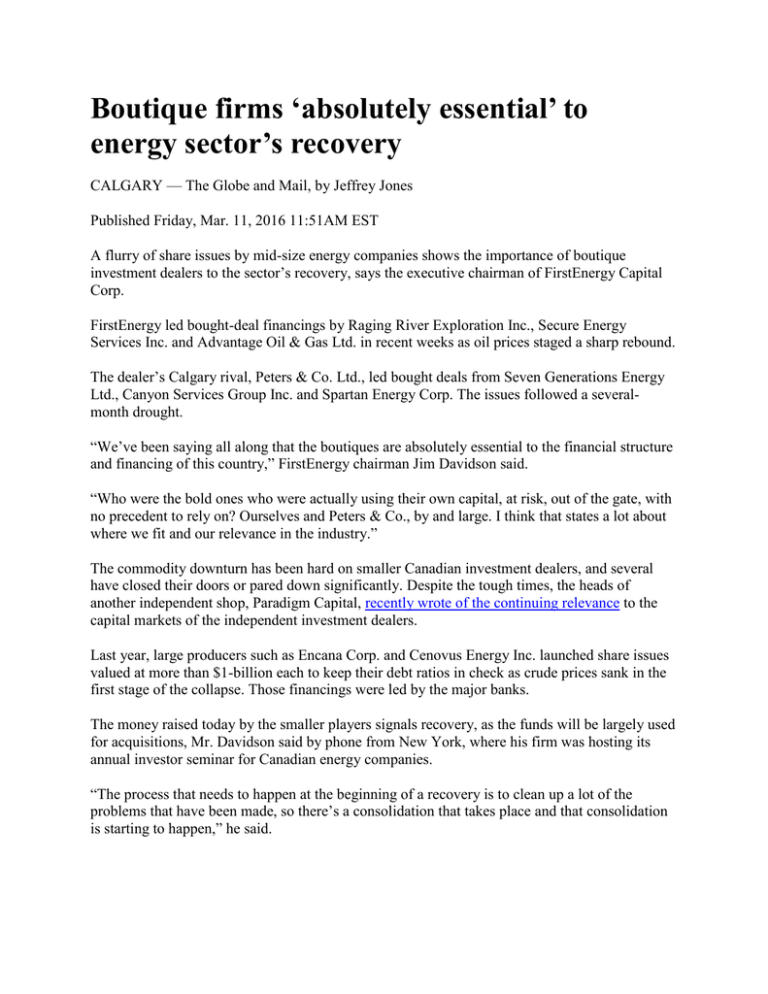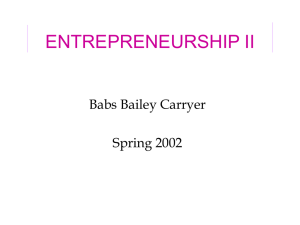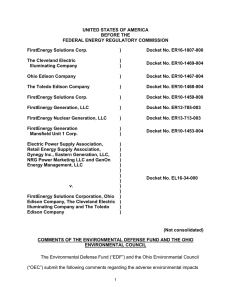Boutique firms `absolutely essential` to energy sector`s recovery
advertisement

Boutique firms ‘absolutely essential’ to energy sector’s recovery CALGARY — The Globe and Mail, by Jeffrey Jones Published Friday, Mar. 11, 2016 11:51AM EST A flurry of share issues by mid-size energy companies shows the importance of boutique investment dealers to the sector’s recovery, says the executive chairman of FirstEnergy Capital Corp. FirstEnergy led bought-deal financings by Raging River Exploration Inc., Secure Energy Services Inc. and Advantage Oil & Gas Ltd. in recent weeks as oil prices staged a sharp rebound. The dealer’s Calgary rival, Peters & Co. Ltd., led bought deals from Seven Generations Energy Ltd., Canyon Services Group Inc. and Spartan Energy Corp. The issues followed a severalmonth drought. “We’ve been saying all along that the boutiques are absolutely essential to the financial structure and financing of this country,” FirstEnergy chairman Jim Davidson said. “Who were the bold ones who were actually using their own capital, at risk, out of the gate, with no precedent to rely on? Ourselves and Peters & Co., by and large. I think that states a lot about where we fit and our relevance in the industry.” The commodity downturn has been hard on smaller Canadian investment dealers, and several have closed their doors or pared down significantly. Despite the tough times, the heads of another independent shop, Paradigm Capital, recently wrote of the continuing relevance to the capital markets of the independent investment dealers. Last year, large producers such as Encana Corp. and Cenovus Energy Inc. launched share issues valued at more than $1-billion each to keep their debt ratios in check as crude prices sank in the first stage of the collapse. Those financings were led by the major banks. The money raised today by the smaller players signals recovery, as the funds will be largely used for acquisitions, Mr. Davidson said by phone from New York, where his firm was hosting its annual investor seminar for Canadian energy companies. “The process that needs to happen at the beginning of a recovery is to clean up a lot of the problems that have been made, so there’s a consolidation that takes place and that consolidation is starting to happen,” he said. Mr. Davidson said attendees at the conference are optimistic that the sector has bounced from the bottom, especially with crude oil having surged about 50 per cent over the past month, which is shifting investors’ appetites for risk. Depressed natural gas prices are still a concern, however. A lingering question among U.S. institutional investors is the chronic delay in adding new crude oil export pipeline capacity, he said. The inability of companies to get crude to export markets, which has meant deep discounts on Canadian supply, is weighing on returns in comparison to U.S. exploration and production companies. Alberta Premier Rachel Notley has ramped up her messaging in support of, especially, TransCanada Corp.’s $15.7-billion Energy East pipeline with other leaders and levels of government, Mr. Davidson acknowledged. However, the projects, which are under federal jurisdiction, require more push from Ottawa, he said. “It’s confusing to the investors down here. Of course, we need capital to invest into in Canada and the energy industry, and capital doesn’t like uncertainty - uncertainty in terms of direction, and in this case support, but also uncertainty in terms of timelines,” he said. “So it’s easier for them to invest within the U.S. at the moment, because the rules of the game are more firmly understood.”








